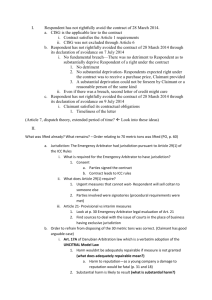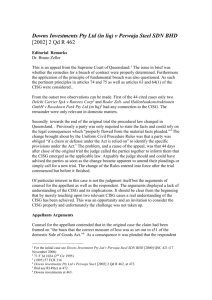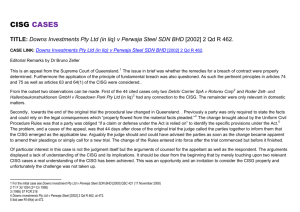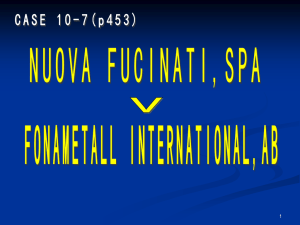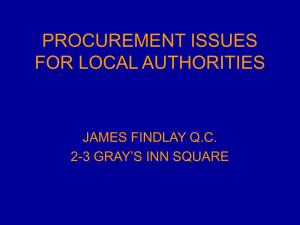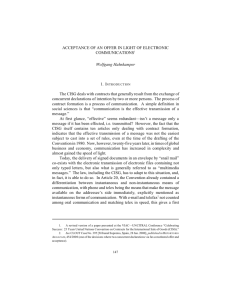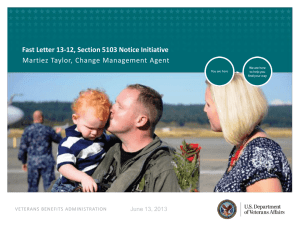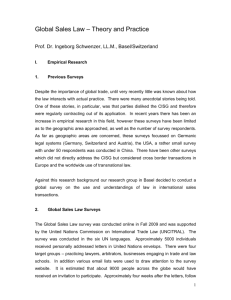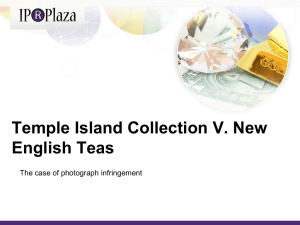CISG Issues- 2014 Vis Problem, Arbitration Class
advertisement
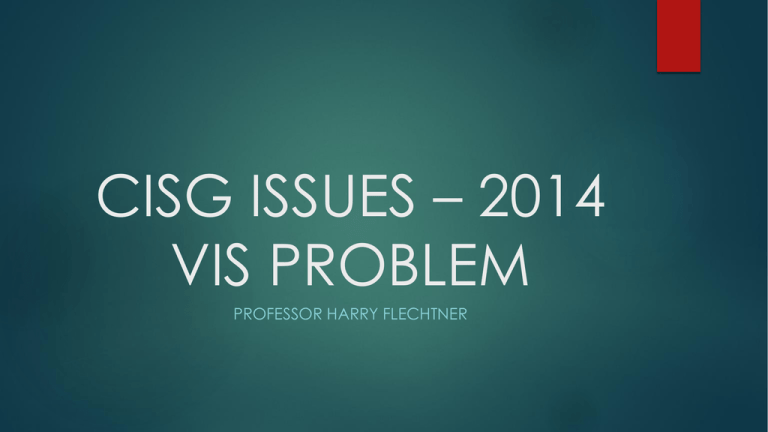
CISG ISSUES – 2014 VIS PROBLEM PROFESSOR HARRY FLECHTNER Applicability of the CISG to the 2014 Vis Transaction CISG Article 1 requirements: Contract for the sale of goods. International. Either Both parties located in Contracting States (Art. 1(1)(a)), or PIL rules lead to application of the law of a Contracting State. Statement of Claim para 18. COL clause in Contract clause 20: “The contract . . . shall be governed by the law of Danubia.” Danubia is CISG Contracting State. Claimant located in Equatoriana; Respondent in Mediterraneo; Claimant’s parent located in Ruritania. Problem only specifies Danubia is a Contracting State. ISSUE ACCORDING TO PROCEDURAL ORDER NO. 1: “Has Respondent rightfully avoided the contract of 28 March 2014 by it declarations of avoidance of 7 July 2014 [See Claimant’s Exhibit 6], or 9 July 2014?” [See Respondent’s Exhibit 4]. Questions: Did Claimant breach the contract? If yes, did the breach justify the remedy of avoidance? If yes, did the Respondent properly follow the prescribed procedure to avoid the contract? Note simplification of issue in para 2 of Procedural Order No. 1. Did Claimant Breach the Contract? What part or parts of the Contract of 28 March 2014 does Respondent allege that Claimant breached? See Article 4 – the obligation to establish a letter of credit. What is a “letter of credit,” which of the parties benefits from it, and why was it included in this contract? In general, how does a letter of credit work in connection with a sales transaction? “Applicant,” “issuing bank,” “beneficiary,” “drafts,” “presentation.” What law governs Claimant’s obligation to establish a letter of credit? What law governs the issuing bank’s obligations under the letter of credit contemplated by this contract? What is the “Uniform Customs and Practice for Documentary Credits” (UCP 600) mentioned in Article 4 of the contract? [Google “UCP 600” and click on pdf for “UCP 600 – USU OCW” (the second link in my google search results).] Basic legal principles for L/C’s: consider UCP 600 Articles 4, 5, 7, 14, 15 and 16. Did Claimant Breach the Contract? Did Claimant breach the contract when it provided the first L/C on June 4? Answer paras. 18-20 – wrong quantity term of L/C. See CISG Art. 54 Also, “different delivery term”: Cl. Ex. 7. [See K Art. 5, Cl. Ex. 5. Compare Cl. Ex. 8] RE “CIF” vs. CIP” see next slide. See compliance standard in UCP Art. 14, esp. (d) & (e). [Is this relevant?] If first L/C constituted a breach, did Claimant have right to “cure” up to the date that contract required the letter of credit? Cf. CISG Art. 34 [Compare CISG Arts. 37 & 48.] Consider CISG Art. 7(2). Did Claimant have right to “cure” after the date that contract required the letter of credit? If Respondent avoided the contract, did that cut off any right to cure? See CISG Arts. 64, 25, and 26. If Claimant had cure right, did it in fact cure? [See discussion of second L/C below.] Delivery Terms: Contract Article 5 and the June 4 Letter of Credit Article 5 of Contract: Shipment required to be “CIF (INCOTERMS 2010), Oceanside, Equatoriana, not later than 60 days after receipt of Letter of Credit” What is “INCOTERMS 2010”? L/C of 4 June (Cl. Ex.5) provides “CIP Vulcan Coltan, 21 Magma Street, Oceanside Equatoriana.” [Compare L/C of July 8, Cl. Ex. 8. What is the difference between “CIF” and “CIP”? Are there any problems with the CIP address in the L/C of 4 June? Consider UCP Article 14(j). [Is this relevant?] Did Claimant Breach the Contract? (second theory) Did Claimant breach the contract when it provided the second L/C on July 8? Answer paras 21-24. CISG Art. 54. Theories of breach: Timing. [Answer paras 15, 23, 33-34; K clauses 4 & 15 (compare K clause 2); K clause 15 re Answer Art. 33; CISG Arts. 27 (compare Art. 18(2)).] Was satisfaction of K requirements cut off by avoidance of contract? Respondent’s Exhibit 4. Answer paras 24 & 33. Lack of Good Faith? [Answer para 22; Respondent’s Exhibits 1 & 2 (Witness Statements); CISG Art. 7(1) & (2).] Requiring a commercial invoice [Answer paras. 24 & 35 & Resp.’s Exhibit 4. See UCP Art. 18 (is this relevant?).] Assuming Claimant Breached, Did the Breach Justify Avoidance? CISG Art. 64(1)(a). Fundamental Breach. CISG Art. 25. Answer paras 24, 30 & 35, Respondent’s Exhibit 4. Assuming Claimant Fundamentally Breached, Did Respondent Properly Avoid Contract (procedure)? CISG Article 26. First Notice of avoidance, 7 July 2014 [Cl. Ex. 7.] Avoidance based on July 4 L/C, so subject to “cure” defense (as well as argument that any breach was not fundamental. Second Notice of Avoidance, 9 July 2014 [Resp. Ex. 4.] Occurs after July 8 L/C; subject to argument that this cured any deficiency in July 4 L/C, and is itself adequate to satisfy to satisfy Contract Article 4 or that any breach was not fundamental breach. Consider also Article 64(2)(a). Additional CISG Provisions Silence as Acceptance. CISG Art. 18(2) CISG Article 9.

